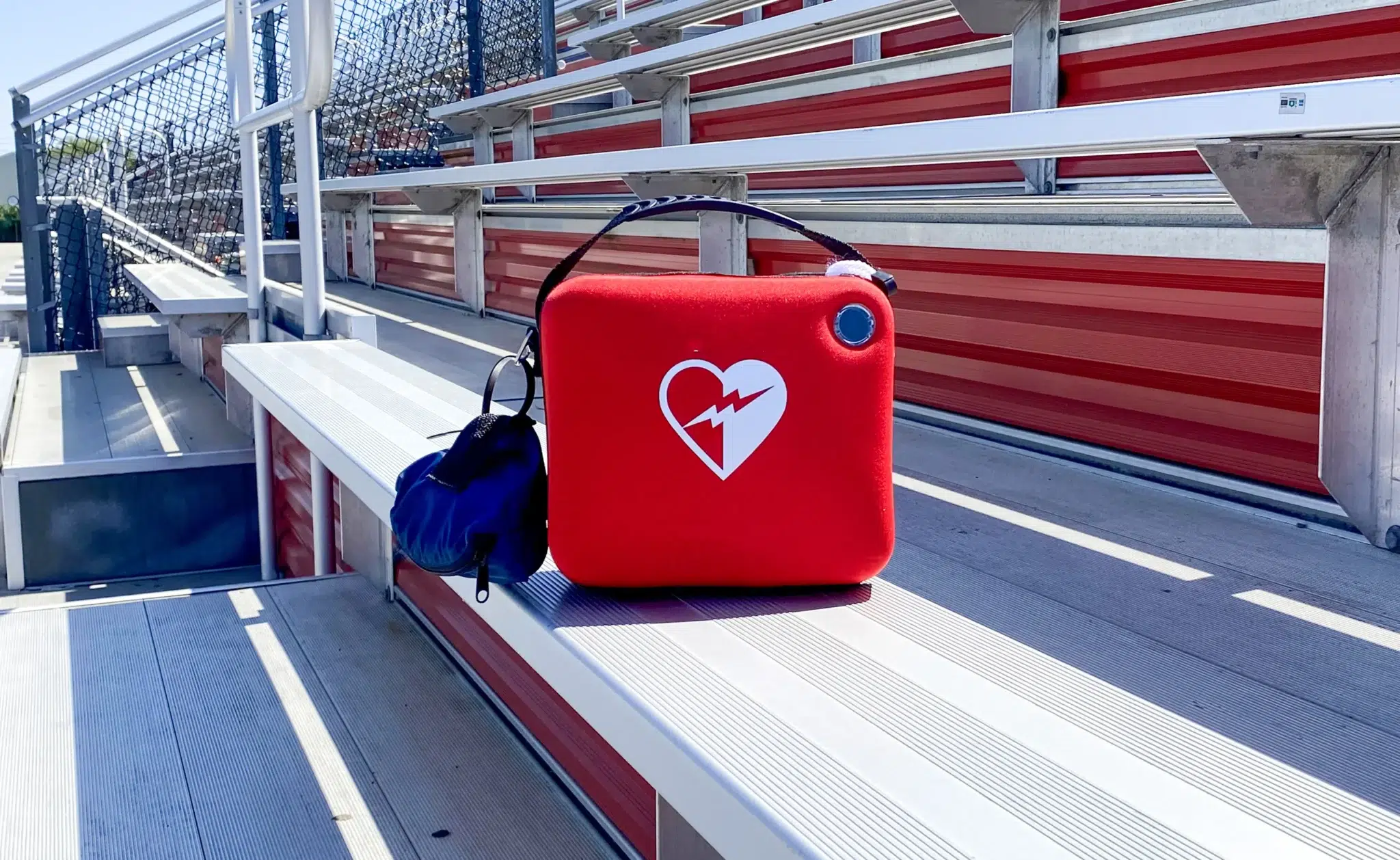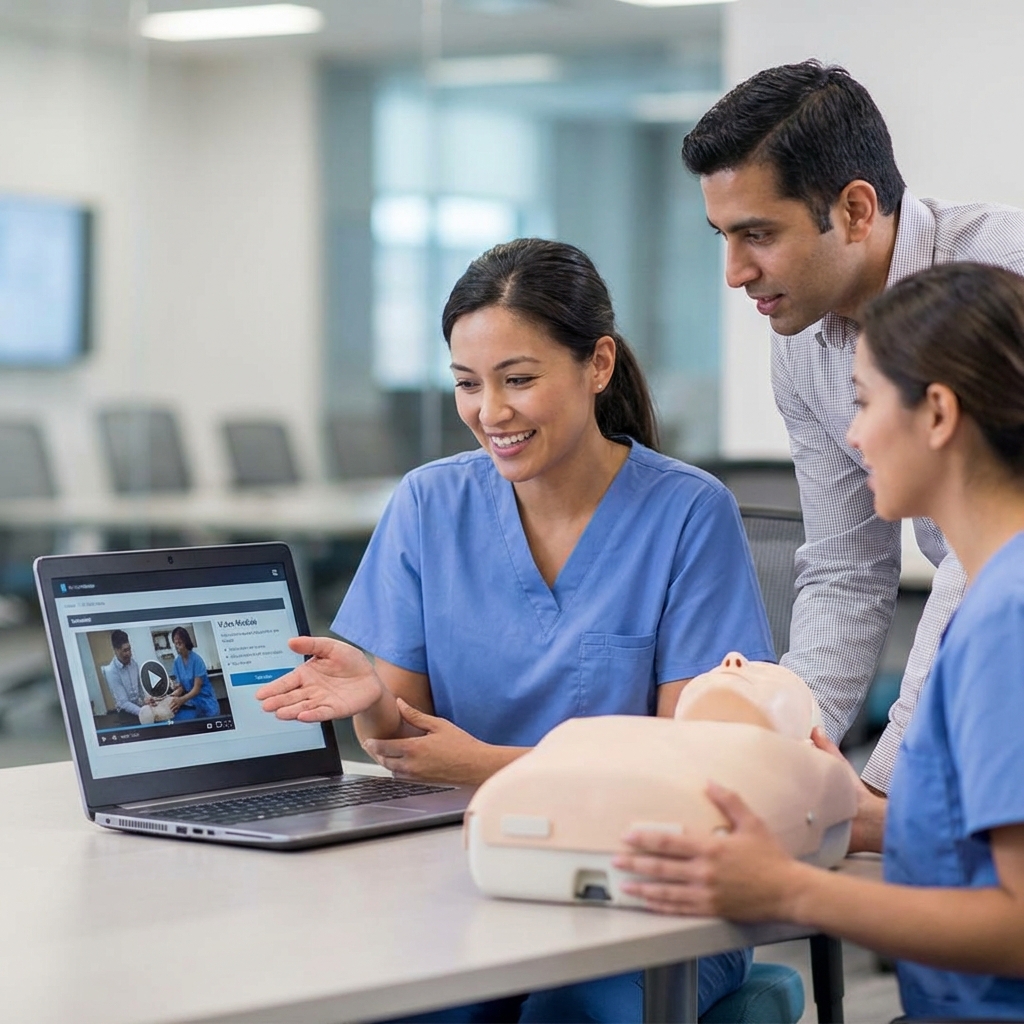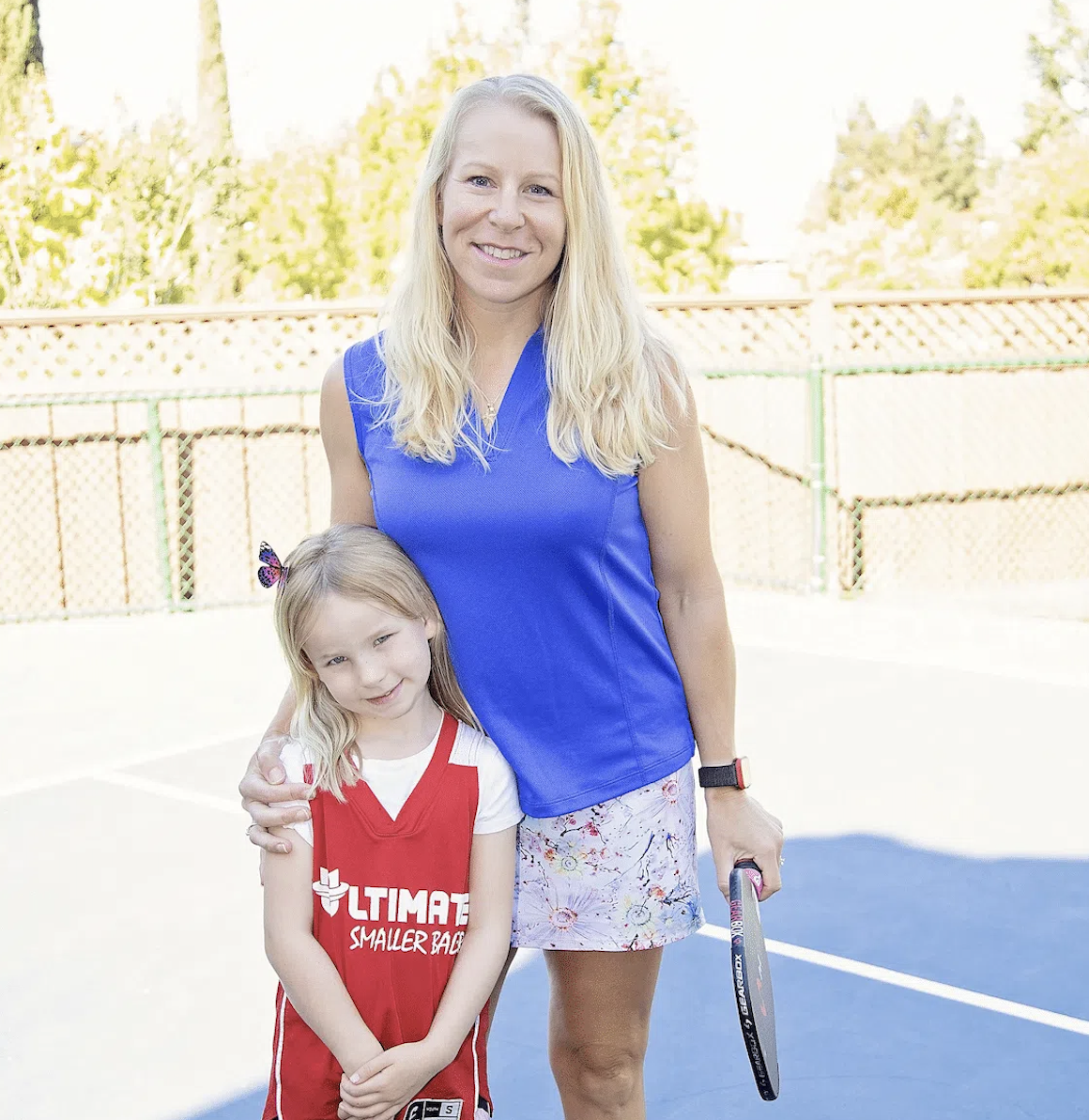As a healthcare professional, you know that seconds can matter in an emergency, especially when a child’s life is on the line. Pediatric Advanced Life Support (PALS) training equips you with the skills to respond swiftly and effectively in these critical situations. This article serves as your comprehensive guide to pediatric advanced life support in San Francisco, covering everything from the core components of PALS training to choosing the right certification provider. We’ll explore the benefits of PALS certification, the various learning formats available, and how to prepare for your course, ensuring you’re well-equipped to handle any pediatric emergency.
Key Takeaways
- PALS certification equips you with life-saving pediatric emergency skills: This specialized training covers essential assessment, resuscitation, and treatment protocols, giving you the confidence to act decisively in critical situations.
- Finding the right PALS course involves several key considerations: Look for AHA-accredited providers with experienced instructors, a comprehensive curriculum, and flexible learning options like those offered by Safety Training Seminars.
- Staying current with your PALS certification demonstrates your commitment to high-quality care: Plan for recertification every two years and explore continuing education opportunities to maintain your expertise in pediatric advanced life support.
What is Pediatric Advanced Life Support (PALS)?
Pediatric Advanced Life Support (PALS) is specialized training that equips healthcare professionals with the skills to manage pediatric emergencies. It focuses on a systematic approach to pediatric assessment, basic life support, PALS treatment algorithms, and effective resuscitation. The goal is to improve the quality of care for seriously ill or injured infants and children, increasing their survival rate. PALS builds upon Basic Life Support (BLS) and emphasizes high-performance team dynamics and communication during emergencies. Learn more about our PALS certification in San Francisco.
Key PALS Training Components
PALS courses cover a range of topics essential for managing pediatric emergencies. These include recognizing and responding to respiratory distress and failure, shock, cardiac arrest, and other life-threatening conditions. The training emphasizes early intervention and evidence-based treatment protocols. Hands-on skill practice is a key part of the course, including airway management, vascular access, and medication administration. Participants learn to use specialized equipment like bag-mask ventilators and defibrillators, practicing their skills through realistic simulations. This builds confidence and proficiency in applying these skills under pressure.
Why PALS is Important for Healthcare Professionals
PALS certification is crucial for any healthcare provider caring for infants and children. It provides the skills to recognize and respond to life-threatening situations, from respiratory distress to cardiac arrest. This specialized training is essential for professionals in emergency departments, intensive care units, and other critical care settings. PALS certification demonstrates a commitment to high-quality pediatric care and can improve career opportunities. It also gives healthcare professionals the confidence to act decisively and effectively in emergencies, potentially saving lives. Safety Training Seminars offers convenient PALS courses in San Francisco, Daly City, San Mateo, and Oakland.
Top PALS Certification Providers in San Francisco
Finding the right PALS certification course is crucial for healthcare professionals. Here’s a look at some of the leading providers in San Francisco:
Safety Training Seminars
Safety Training Seminars offers daily American Heart Association (AHA) courses in CPR, BLS, ACLS, and PALS at competitive prices, making these essential skills accessible to a broad audience. They’re committed to delivering high-quality training and excellent customer service.
Heart Start CPR
Heart Start CPR provides AHA PALS certification and recertification classes throughout the San Francisco Bay Area. Their focus is preparing healthcare professionals to confidently manage pediatric emergencies.
UCSF Kanbar Center
The UCSF Kanbar Center is a reputable option for healthcare training in the Bay Area. They offer a range of AHA courses, including BLS, PALS, and ACLS.
American Red Cross
The American Red Cross also offers Pediatric Advanced Life Support (PALS) certification. They position their PALS course as scientifically sound and educationally advantageous.
Bay Area CPR
Bay Area CPR prioritizes affordability and convenience, providing various PALS certification options tailored for healthcare professionals throughout the region.
PALS Certification: Costs & Formats
Understanding the costs and available formats for PALS certification is essential for making informed decisions about your training. Let’s break down the typical expenses and explore the various learning options.
Initial Certification Fees
The initial PALS certification typically costs around $290. This fee generally covers the online course materials, in-person skills testing, and your official certification card. Safety Training Seminars offers competitive pricing for initial PALS certification, ensuring you receive high-quality training at a reasonable cost.
Recertification Costs
For healthcare providers renewing their PALS certification, the recertification fee is usually around $190. This cost covers the updated training materials and skills verification required to maintain your PALS credentials. Staying current with the latest guidelines is crucial for providing effective pediatric advanced life support. Providers like Heart Start CPR offer PALS classes for recertification.
In-Person, Online, & Blended Learning
PALS certification courses are available in several formats to suit different learning styles and schedules. Many providers offer a blended learning option, combining online coursework with in-person skills practice. This approach often involves completing 3–4 hours of self-paced online modules followed by a shorter, focused session (30–40 minutes) for hands-on skills testing. Safety Training Seminars provides blended learning PALS courses. Some institutions, like the UCSF Kanbar Center, offer a more extensive blended format with a larger online component (around 7 hours) and a longer in-person skills session (approximately 4 hours).
Course Duration & Time Commitment
The total time commitment for initial PALS certification is typically around 12 hours, encompassing both the online and in-person components. If you choose a blended learning format, expect to spend 3–6 hours on the online modules, depending on your prior experience. The in-person skills practice and testing usually take an additional 15–30 minutes each.
What Happens in a PALS Course?
A Pediatric Advanced Life Support (PALS) course provides healthcare professionals with the knowledge and skills to effectively manage pediatric emergencies. It blends classroom learning with hands-on practice, ensuring you’re prepared to respond confidently in critical situations. Here’s a closer look at what you can expect:
Core Curriculum
PALS courses cover a core curriculum focused on the systematic assessment and management of critically ill infants and children. You’ll learn key algorithms for resuscitation, including basic life support, airway management, and treatment of cardiac arrhythmias. The curriculum also emphasizes the importance of teamwork and communication in emergency situations. This foundational knowledge prepares you to make quick, informed decisions under pressure.
Hands-on Skills Practice
PALS isn’t just about theory. The course includes extensive hands-on practice to develop essential skills. You’ll work with realistic mannequins and training equipment to practice techniques like intubation, IV insertion, and medication administration. This practical experience builds muscle memory and confidence, allowing you to apply your knowledge effectively in real-world scenarios.
Simulation Scenarios
To solidify your learning, PALS courses incorporate realistic simulation scenarios. These simulations mimic real pediatric emergencies, giving you the opportunity to apply your skills in a safe, controlled environment. You’ll work as part of a team to assess, diagnose, and manage simulated patients, reinforcing the importance of team dynamics and communication in high-stress situations. This immersive experience helps you develop critical thinking skills and refine your approach to pediatric emergencies.
Assessment & Certification
After completing the PALS course and successfully demonstrating your knowledge and skills, you’ll receive an American Heart Association (AHA) PALS Provider certification card. This nationally recognized certification is valid for two years and demonstrates your proficiency in pediatric advanced life support. It’s a valuable credential for healthcare professionals, validating your expertise and commitment to providing high-quality care.
Benefits of PALS Certification
Earning your PALS certification offers several significant advantages, both personally and professionally. It’s not just a credential for your resume; it’s about gaining skills and knowledge that can make a real difference.
Enhanced Pediatric Emergency Response
PALS certification equips healthcare providers with the skills to manage pediatric emergencies. This specialized training, like the courses offered at Safety Training Seminars, prepares you to handle critical situations involving infants and children. From assessment to intervention, you’ll learn evidence-based protocols to provide the best possible care, translating to improved patient outcomes and a greater chance of survival.
Career Advancement
A PALS certification can open doors to new opportunities. This credential is often a requirement for many healthcare roles and can be a significant factor in career advancement. Whether you’re a nurse, paramedic, or physician, PALS demonstrates your commitment to specialized pediatric care. This makes you a more competitive candidate and can lead to increased earning potential as employers recognize the value of this specialized skill set. Explore how PALS certification can benefit your career at Safety Training Seminars.
Increased Confidence in Critical Situations
Working in pediatric critical care can be incredibly demanding. PALS certification not only enhances your skills but also builds confidence in managing emergencies. Knowing you can respond effectively in high-pressure situations allows you to remain calm, think clearly, and provide the best possible care, even under stress. Illinois Safety discusses challenges healthcare workers face and how PALS training helps.
Specialized Pediatric Knowledge
PALS provides specialized knowledge of pediatric emergencies that goes beyond basic CPR training. It covers the unique physiological differences between children and adults, allowing you to tailor your interventions appropriately. This targeted knowledge is essential for providers who regularly work with children and need a deep understanding of their specific medical needs. Bay Area CPR offers further insights into the specialized knowledge gained through PALS certification.
Choosing a PALS Provider in San Francisco
Finding the right PALS provider is crucial for a positive and effective learning experience. With several options in San Francisco, consider these key factors to help you make the best decision:
Accreditation & Recognition
First, verify the provider’s accreditation. Ensure they are officially recognized by the American Heart Association (AHA). Safety Training Seminars offers AHA-certified PALS courses, guaranteeing the training aligns with national standards. This accreditation is essential for the validity and recognition of your certification.
Experienced Instructors
The quality of instruction significantly impacts how well you learn the material. Look for providers with a team of experienced, certified instructors. Safety Training Seminars highlights its instructors’ experience, emphasizing the importance of expert guidance in PALS training. Experienced instructors can offer practical insights and create a more engaging learning environment.
Comprehensive Curriculum
A thorough PALS course should cover a comprehensive curriculum, including essential concepts, skills, and simulations. The curriculum should emphasize real-life scenarios, preparing you for the challenges of pediatric emergencies. A robust curriculum ensures you gain the knowledge and confidence to apply your skills effectively. Look for courses that offer hands-on practice and simulated scenarios.
Flexible Learning Options
Juggling work and other commitments can make scheduling training difficult. Seek providers offering flexible learning options, such as in-person, online, or blended learning formats. The rise of online PALS courses has made obtaining and renewing certification more convenient, allowing you to learn at your own pace and fit the training into your schedule.
Competitive Pricing
While cost shouldn’t be the only factor, compare pricing among different providers. Safety Training Seminars is known for its competitive pricing for PALS certification in the San Francisco Bay Area. Finding a provider that offers high-quality training at a competitive price makes professional development more accessible.
Prepare for Your PALS Certification
Getting ready for your PALS certification involves a few key steps. Understanding the pre-course requirements, gathering your study materials, and employing a few smart strategies can make a big difference in your success.
Pre-course Requirements
Most PALS programs require proof of a current BLS certification to register. Make sure you have your BLS provider card handy when you sign up for your PALS course. Check out Safety Training Seminars’ BLS certification courses if you need to renew or obtain your BLS certification.
Study Materials & Resources
Online PALS certification courses often provide all the materials you’ll need, including manuals and online resources. Many PALS classes also incorporate case studies and practice questions to reinforce learning. Check with your chosen provider to see what materials they offer. Safety Training Seminars provides comprehensive study materials to help you succeed.
Tips for Success
Working through practice questions is one of the best ways to prepare for the PALS exam. Familiarize yourself with the course content and take advantage of any practice exams or quizzes offered by your training provider. This will help you identify areas where you need to focus your study time.
Overcoming Challenges
One common challenge is balancing work schedules with the time commitment required for training. Look for providers that offer flexible scheduling options. Safety Training Seminars offers daily PALS classes across multiple locations, making it easier to fit the training into your busy schedule. PALS courses also use simulations and real-life scenarios to help you develop the confidence to apply your skills in actual emergencies.
Maintain Your PALS Certification
Once you’ve earned your PALS certification, staying current is key. PALS guidelines and best practices evolve, so regular recertification ensures you’re always prepared to provide the highest quality care. This section covers everything you need to know about maintaining your PALS credentials.
Recertification Timeline
PALS certification is valid for two years. To maintain your credentials, you’ll need to recertify before it expires. Keep track of your expiration date and plan to complete your PALS recertification course a few months in advance. This avoids any last-minute scrambling and ensures continuous coverage.
Continuing Education
Beyond recertification, ongoing learning is crucial for any healthcare professional. Consider supplementing your PALS recertification with continuing education opportunities. Reading industry journals, attending relevant conferences, and participating in workshops can broaden your knowledge and keep your skills sharp. Staying informed about the latest advancements in pediatric care allows you to provide the best possible treatment.
Stay Updated on Guidelines
Staying up-to-date on the latest American Heart Association guidelines is essential for maintaining the effectiveness of your training. Regularly review updated protocols and recommendations to ensure your practices align with current standards. You can find the most recent guidelines and resources on the American Heart Association website. This proactive approach will help you confidently handle any pediatric emergency.
Why Choose Safety Training Seminars?
Finding the right PALS certification course is crucial for your career and your confidence in responding to pediatric emergencies. Safety Training Seminars offers several advantages that make us a top choice for healthcare providers in the San Francisco Bay Area.
Daily Courses
We understand that busy schedules can make finding time for professional development challenging. That’s why we offer daily PALS courses in San Francisco, Daly City, San Mateo, and Oakland, CA. This flexibility allows you to choose a class time that works for you, minimizing disruption to your work or personal commitments. We strive to accommodate everyone seeking PALS certification.
AHA Certification
Our PALS courses align with the latest American Heart Association guidelines and award you with a nationally recognized AHA PALS certification upon successful completion. This certification validates your commitment to providing high-quality pediatric care and is often a prerequisite for many healthcare positions. It also ensures your training reflects the most current standards.
Experienced Instructors
Our instructors are experienced healthcare professionals dedicated to providing comprehensive and engaging PALS training. As a woman-owned AHA Training Center, we prioritize high-quality instruction and a supportive learning environment. Our instructors are passionate about sharing their expertise and helping you develop essential skills for pediatric emergency situations.
Flexible Learning
We recognize that healthcare professionals have diverse learning needs. In addition to our in-person PALS courses, we offer the RQI program, a self-paced option for BLS, ACLS, and PALS recertification. This flexible approach allows you to renew your certifications conveniently and efficiently.
Competitive Pricing & Low Price Guarantee
We believe that high-quality PALS training should be accessible to all. We offer competitive pricing on all our courses and a low-price guarantee. We’re confident that you won’t find a better value for your PALS certification in the San Francisco Bay Area. Our commitment to affordable training ensures cost isn’t a barrier to acquiring these life-saving skills.
Common PALS Certification Questions
This section addresses some of the most frequently asked questions about PALS certification. Understanding these key aspects will help you approach your training with confidence.
Certification Validity
How long is my PALS certification good for? PALS certification, like other certifications from the American Heart Association, is valid for two years. This timeframe reflects the evolving nature of best practices in pediatric emergency care. Staying current with the latest guidelines ensures you provide the highest quality care.
Online vs. In-Person Training
Is online PALS training as good as in-person training? A common misconception is that online PALS training isn’t as comprehensive as in-person instruction. However, many online programs offer robust content covering all the necessary material. The key is to choose a reputable provider that aligns with the American Heart Association guidelines. The best format depends on your learning style and preferences. Some providers offer blended learning, combining online modules with in-person skills sessions.
Recertification Requirements
How do I renew my PALS certification? To maintain your PALS certification, you must complete a PALS recertification course before your current certification expires. This refresher course covers updates to guidelines and reinforces essential skills. Keeping your certification current demonstrates your commitment to providing optimal pediatric care.
PALS Prerequisites
What do I need before taking a PALS course? Most PALS courses require participants to hold a current BLS (Basic Life Support) certification. This prerequisite ensures you have a foundational understanding of life-saving techniques before learning the specialized skills taught in PALS. Find information about our BLS certification courses. Verify the specific prerequisites with your chosen PALS provider before registering for a course.
If you’re looking to enhance your CPR skills, consider joining BLS CPR Classes in Vacaville to ensure you’re prepared for any emergency. Additionally, explore the specialized programs offered by UCSF to further your training and expertise.
Related Articles
- PALS Classes in San Francisco (Mission Bay) – San Francisco CPR Classes
- Advanced Cardiac Life Support in San Mateo: Get Certified – San Francisco CPR Classes
- American Heart Association Courses in San Francisco – San Francisco CPR Classes
- HeartCode BLS Oakland: Your Certification Guide – San Francisco CPR Classes
- RQI in Oakland: Your Guide to CPR Certification – San Francisco CPR Classes
Frequently Asked Questions
How can PALS certification benefit my healthcare career? PALS certification is often a required or preferred qualification for many positions involving pediatric care, especially in emergency or critical care settings. It demonstrates a commitment to specialized training and can significantly enhance your career prospects and earning potential. It also provides the confidence to handle pediatric emergencies effectively.
What’s the difference between PALS and BLS? BLS (Basic Life Support) teaches fundamental life-saving techniques applicable to all age groups. PALS (Pediatric Advanced Life Support) builds upon BLS, focusing specifically on the advanced management of pediatric emergencies. It delves into specialized algorithms, equipment, and considerations unique to infants and children. Most PALS courses require a current BLS certification as a prerequisite.
What learning formats are available for PALS certification? PALS certification courses are offered in various formats, including in-person classroom sessions, blended learning (combining online modules with in-person skills practice), and online-only options. The format that best suits you depends on your learning style, schedule, and access to resources. Many providers offer flexible scheduling to accommodate busy professionals.
How much does PALS certification cost, and how long is it valid? The cost of PALS certification varies depending on the provider and format but typically ranges from $200 to $300 for initial certification and slightly less for recertification. Certification is valid for two years, after which you’ll need to recertify to maintain your credentials and stay updated on the latest guidelines.
What if my BLS certification expires before my PALS certification? Since a current BLS certification is usually a prerequisite for PALS courses and recertification, you’ll need to renew your BLS before taking or recertifying in PALS. Many training centers offer both BLS and PALS courses, making it convenient to maintain both certifications.









